MMM793 Case Study: Managing Cultural Projects & Event Success
VerifiedAdded on 2023/06/18
|9
|2807
|233
Case Study
AI Summary
This case study examines the critical role of event purpose and planning in managing cultural projects, using Melbourne Music Week as a prime example. It reviews literature on event management, emphasizing the importance of clear communication of event goals, flexible planning to adapt to uncertainties, and the integration of sustainability. The case study highlights Melbourne Music Week's focus on sustainability through eco-friendly practices such as paperless ticketing and accessible public transport. The analysis underscores the need for event organizers to understand market demands, visualize desired outcomes, and utilize event planning models like Smith’s Event Planning Model to ensure success. The report concludes that effective event planning, clear objectives, and adaptability are essential for achieving event goals and maximizing positive impact.
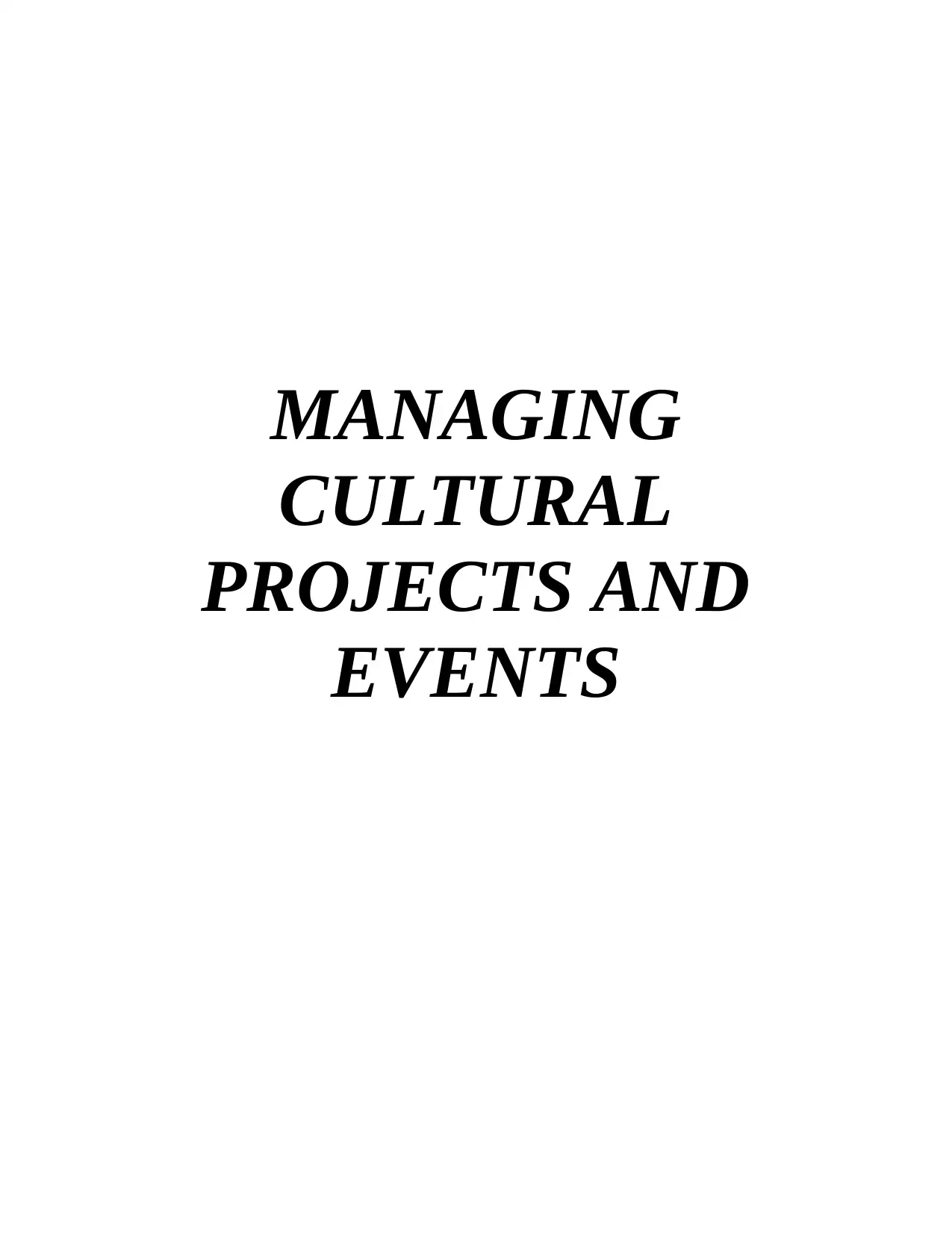
MANAGING
CULTURAL
PROJECTS AND
EVENTS
CULTURAL
PROJECTS AND
EVENTS
Paraphrase This Document
Need a fresh take? Get an instant paraphrase of this document with our AI Paraphraser
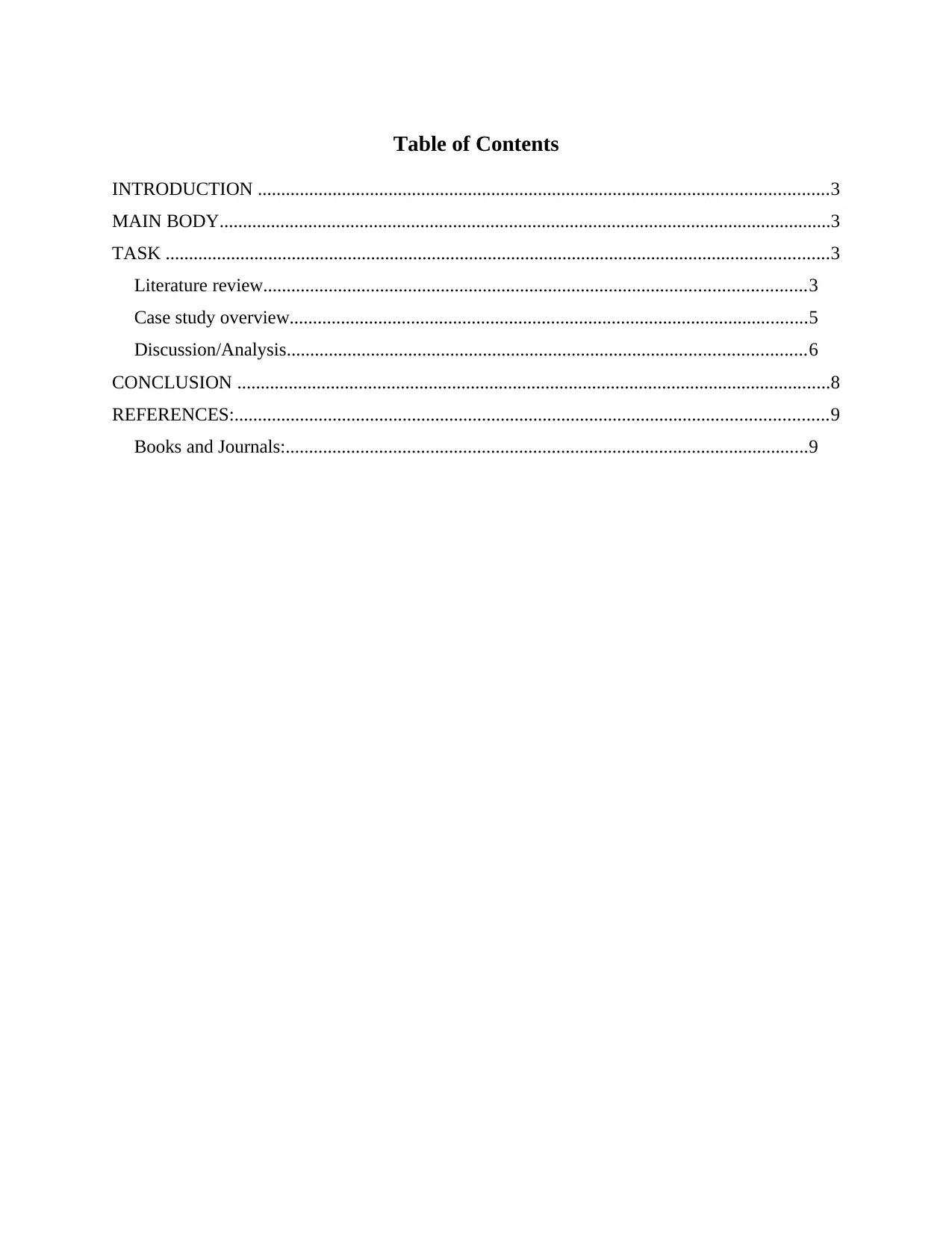
Table of Contents
INTRODUCTION ..........................................................................................................................3
MAIN BODY...................................................................................................................................3
TASK ..............................................................................................................................................3
Literature review....................................................................................................................3
Case study overview...............................................................................................................5
Discussion/Analysis...............................................................................................................6
CONCLUSION ...............................................................................................................................8
REFERENCES:...............................................................................................................................9
Books and Journals:................................................................................................................9
INTRODUCTION ..........................................................................................................................3
MAIN BODY...................................................................................................................................3
TASK ..............................................................................................................................................3
Literature review....................................................................................................................3
Case study overview...............................................................................................................5
Discussion/Analysis...............................................................................................................6
CONCLUSION ...............................................................................................................................8
REFERENCES:...............................................................................................................................9
Books and Journals:................................................................................................................9
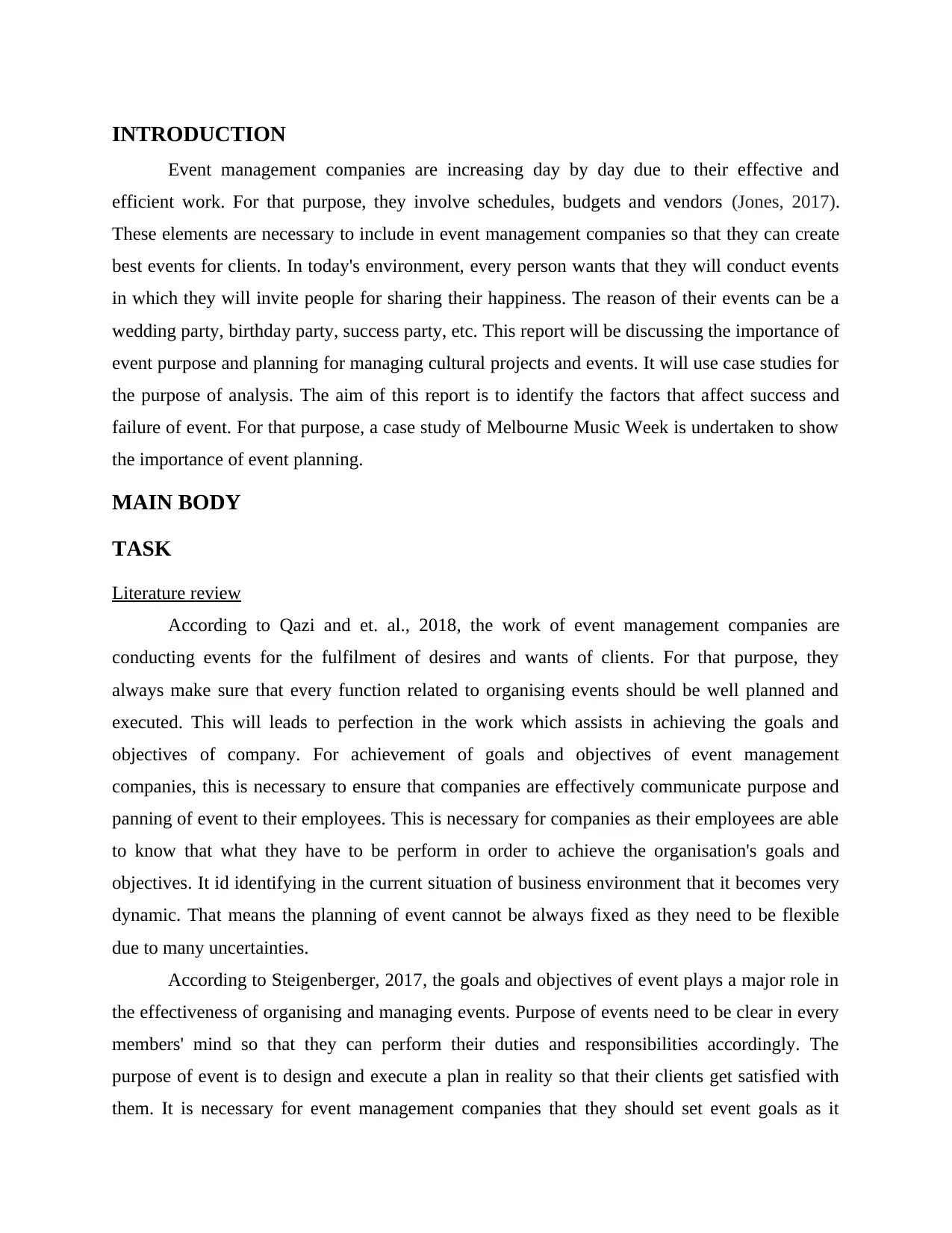
INTRODUCTION
Event management companies are increasing day by day due to their effective and
efficient work. For that purpose, they involve schedules, budgets and vendors (Jones, 2017).
These elements are necessary to include in event management companies so that they can create
best events for clients. In today's environment, every person wants that they will conduct events
in which they will invite people for sharing their happiness. The reason of their events can be a
wedding party, birthday party, success party, etc. This report will be discussing the importance of
event purpose and planning for managing cultural projects and events. It will use case studies for
the purpose of analysis. The aim of this report is to identify the factors that affect success and
failure of event. For that purpose, a case study of Melbourne Music Week is undertaken to show
the importance of event planning.
MAIN BODY
TASK
Literature review
According to Qazi and et. al., 2018, the work of event management companies are
conducting events for the fulfilment of desires and wants of clients. For that purpose, they
always make sure that every function related to organising events should be well planned and
executed. This will leads to perfection in the work which assists in achieving the goals and
objectives of company. For achievement of goals and objectives of event management
companies, this is necessary to ensure that companies are effectively communicate purpose and
panning of event to their employees. This is necessary for companies as their employees are able
to know that what they have to be perform in order to achieve the organisation's goals and
objectives. It id identifying in the current situation of business environment that it becomes very
dynamic. That means the planning of event cannot be always fixed as they need to be flexible
due to many uncertainties.
According to Steigenberger, 2017, the goals and objectives of event plays a major role in
the effectiveness of organising and managing events. Purpose of events need to be clear in every
members' mind so that they can perform their duties and responsibilities accordingly. The
purpose of event is to design and execute a plan in reality so that their clients get satisfied with
them. It is necessary for event management companies that they should set event goals as it
Event management companies are increasing day by day due to their effective and
efficient work. For that purpose, they involve schedules, budgets and vendors (Jones, 2017).
These elements are necessary to include in event management companies so that they can create
best events for clients. In today's environment, every person wants that they will conduct events
in which they will invite people for sharing their happiness. The reason of their events can be a
wedding party, birthday party, success party, etc. This report will be discussing the importance of
event purpose and planning for managing cultural projects and events. It will use case studies for
the purpose of analysis. The aim of this report is to identify the factors that affect success and
failure of event. For that purpose, a case study of Melbourne Music Week is undertaken to show
the importance of event planning.
MAIN BODY
TASK
Literature review
According to Qazi and et. al., 2018, the work of event management companies are
conducting events for the fulfilment of desires and wants of clients. For that purpose, they
always make sure that every function related to organising events should be well planned and
executed. This will leads to perfection in the work which assists in achieving the goals and
objectives of company. For achievement of goals and objectives of event management
companies, this is necessary to ensure that companies are effectively communicate purpose and
panning of event to their employees. This is necessary for companies as their employees are able
to know that what they have to be perform in order to achieve the organisation's goals and
objectives. It id identifying in the current situation of business environment that it becomes very
dynamic. That means the planning of event cannot be always fixed as they need to be flexible
due to many uncertainties.
According to Steigenberger, 2017, the goals and objectives of event plays a major role in
the effectiveness of organising and managing events. Purpose of events need to be clear in every
members' mind so that they can perform their duties and responsibilities accordingly. The
purpose of event is to design and execute a plan in reality so that their clients get satisfied with
them. It is necessary for event management companies that they should set event goals as it
⊘ This is a preview!⊘
Do you want full access?
Subscribe today to unlock all pages.

Trusted by 1+ million students worldwide
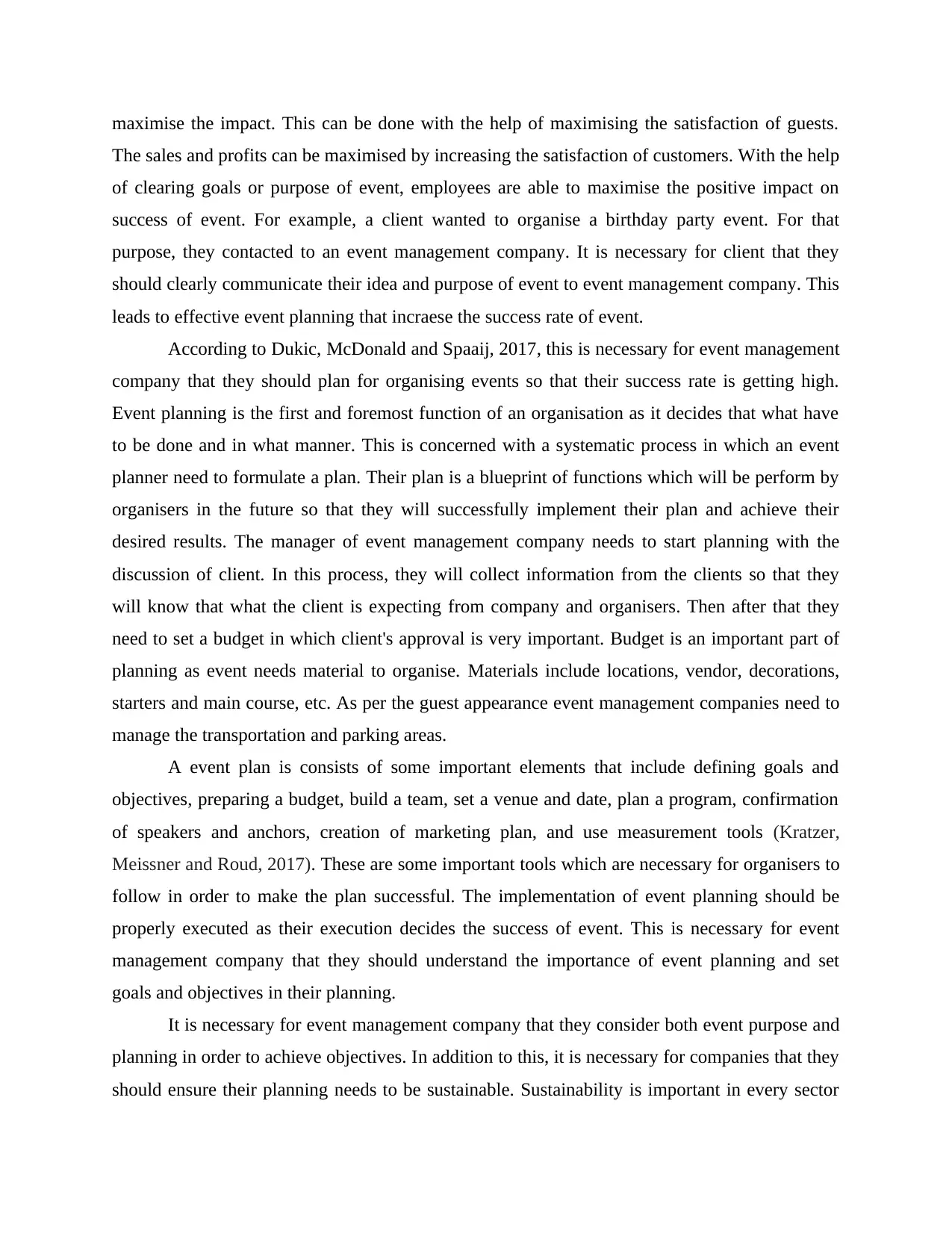
maximise the impact. This can be done with the help of maximising the satisfaction of guests.
The sales and profits can be maximised by increasing the satisfaction of customers. With the help
of clearing goals or purpose of event, employees are able to maximise the positive impact on
success of event. For example, a client wanted to organise a birthday party event. For that
purpose, they contacted to an event management company. It is necessary for client that they
should clearly communicate their idea and purpose of event to event management company. This
leads to effective event planning that incraese the success rate of event.
According to Dukic, McDonald and Spaaij, 2017, this is necessary for event management
company that they should plan for organising events so that their success rate is getting high.
Event planning is the first and foremost function of an organisation as it decides that what have
to be done and in what manner. This is concerned with a systematic process in which an event
planner need to formulate a plan. Their plan is a blueprint of functions which will be perform by
organisers in the future so that they will successfully implement their plan and achieve their
desired results. The manager of event management company needs to start planning with the
discussion of client. In this process, they will collect information from the clients so that they
will know that what the client is expecting from company and organisers. Then after that they
need to set a budget in which client's approval is very important. Budget is an important part of
planning as event needs material to organise. Materials include locations, vendor, decorations,
starters and main course, etc. As per the guest appearance event management companies need to
manage the transportation and parking areas.
A event plan is consists of some important elements that include defining goals and
objectives, preparing a budget, build a team, set a venue and date, plan a program, confirmation
of speakers and anchors, creation of marketing plan, and use measurement tools (Kratzer,
Meissner and Roud, 2017). These are some important tools which are necessary for organisers to
follow in order to make the plan successful. The implementation of event planning should be
properly executed as their execution decides the success of event. This is necessary for event
management company that they should understand the importance of event planning and set
goals and objectives in their planning.
It is necessary for event management company that they consider both event purpose and
planning in order to achieve objectives. In addition to this, it is necessary for companies that they
should ensure their planning needs to be sustainable. Sustainability is important in every sector
The sales and profits can be maximised by increasing the satisfaction of customers. With the help
of clearing goals or purpose of event, employees are able to maximise the positive impact on
success of event. For example, a client wanted to organise a birthday party event. For that
purpose, they contacted to an event management company. It is necessary for client that they
should clearly communicate their idea and purpose of event to event management company. This
leads to effective event planning that incraese the success rate of event.
According to Dukic, McDonald and Spaaij, 2017, this is necessary for event management
company that they should plan for organising events so that their success rate is getting high.
Event planning is the first and foremost function of an organisation as it decides that what have
to be done and in what manner. This is concerned with a systematic process in which an event
planner need to formulate a plan. Their plan is a blueprint of functions which will be perform by
organisers in the future so that they will successfully implement their plan and achieve their
desired results. The manager of event management company needs to start planning with the
discussion of client. In this process, they will collect information from the clients so that they
will know that what the client is expecting from company and organisers. Then after that they
need to set a budget in which client's approval is very important. Budget is an important part of
planning as event needs material to organise. Materials include locations, vendor, decorations,
starters and main course, etc. As per the guest appearance event management companies need to
manage the transportation and parking areas.
A event plan is consists of some important elements that include defining goals and
objectives, preparing a budget, build a team, set a venue and date, plan a program, confirmation
of speakers and anchors, creation of marketing plan, and use measurement tools (Kratzer,
Meissner and Roud, 2017). These are some important tools which are necessary for organisers to
follow in order to make the plan successful. The implementation of event planning should be
properly executed as their execution decides the success of event. This is necessary for event
management company that they should understand the importance of event planning and set
goals and objectives in their planning.
It is necessary for event management company that they consider both event purpose and
planning in order to achieve objectives. In addition to this, it is necessary for companies that they
should ensure their planning needs to be sustainable. Sustainability is important in every sector
Paraphrase This Document
Need a fresh take? Get an instant paraphrase of this document with our AI Paraphraser
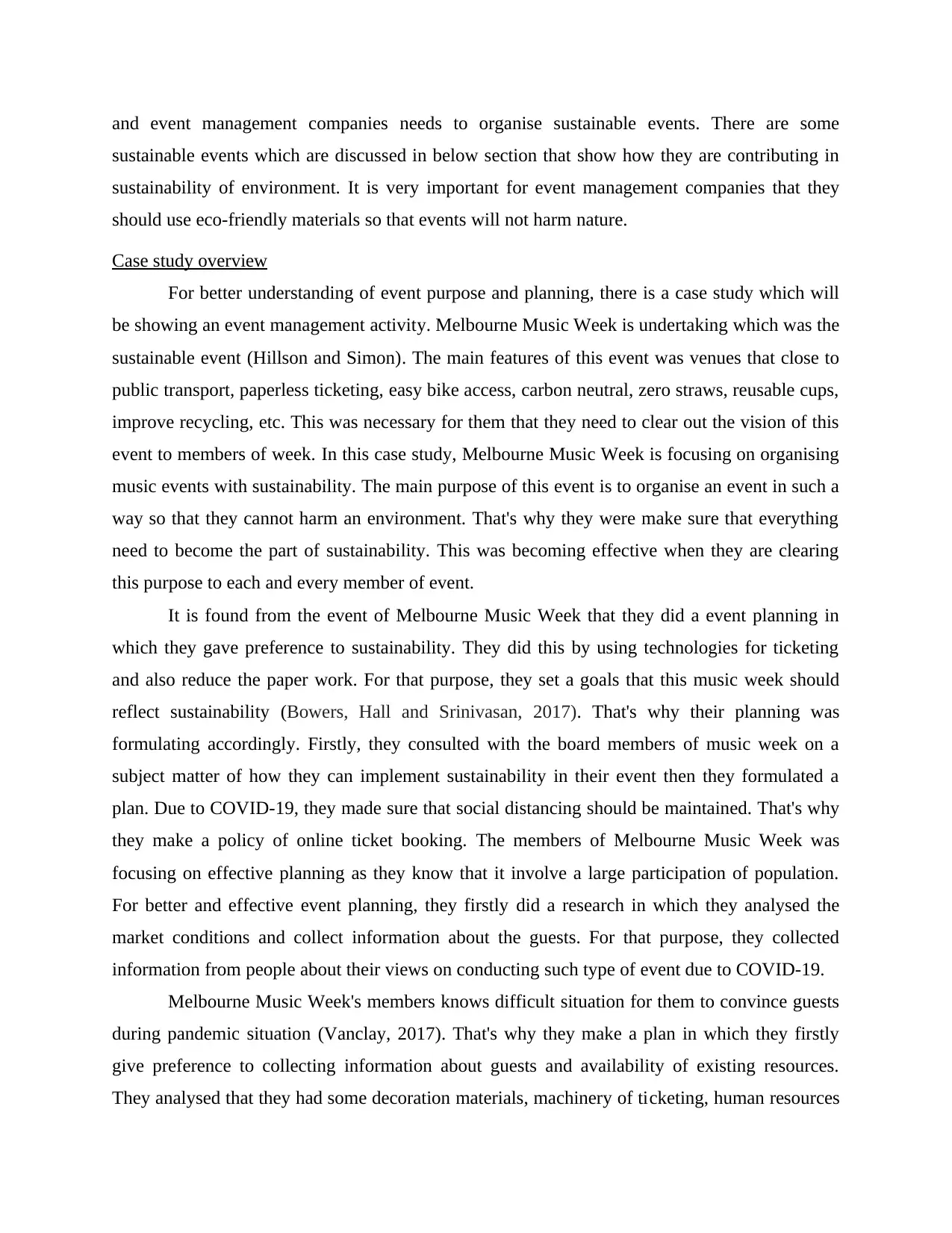
and event management companies needs to organise sustainable events. There are some
sustainable events which are discussed in below section that show how they are contributing in
sustainability of environment. It is very important for event management companies that they
should use eco-friendly materials so that events will not harm nature.
Case study overview
For better understanding of event purpose and planning, there is a case study which will
be showing an event management activity. Melbourne Music Week is undertaking which was the
sustainable event (Hillson and Simon). The main features of this event was venues that close to
public transport, paperless ticketing, easy bike access, carbon neutral, zero straws, reusable cups,
improve recycling, etc. This was necessary for them that they need to clear out the vision of this
event to members of week. In this case study, Melbourne Music Week is focusing on organising
music events with sustainability. The main purpose of this event is to organise an event in such a
way so that they cannot harm an environment. That's why they were make sure that everything
need to become the part of sustainability. This was becoming effective when they are clearing
this purpose to each and every member of event.
It is found from the event of Melbourne Music Week that they did a event planning in
which they gave preference to sustainability. They did this by using technologies for ticketing
and also reduce the paper work. For that purpose, they set a goals that this music week should
reflect sustainability (Bowers, Hall and Srinivasan, 2017). That's why their planning was
formulating accordingly. Firstly, they consulted with the board members of music week on a
subject matter of how they can implement sustainability in their event then they formulated a
plan. Due to COVID-19, they made sure that social distancing should be maintained. That's why
they make a policy of online ticket booking. The members of Melbourne Music Week was
focusing on effective planning as they know that it involve a large participation of population.
For better and effective event planning, they firstly did a research in which they analysed the
market conditions and collect information about the guests. For that purpose, they collected
information from people about their views on conducting such type of event due to COVID-19.
Melbourne Music Week's members knows difficult situation for them to convince guests
during pandemic situation (Vanclay, 2017). That's why they make a plan in which they firstly
give preference to collecting information about guests and availability of existing resources.
They analysed that they had some decoration materials, machinery of ticketing, human resources
sustainable events which are discussed in below section that show how they are contributing in
sustainability of environment. It is very important for event management companies that they
should use eco-friendly materials so that events will not harm nature.
Case study overview
For better understanding of event purpose and planning, there is a case study which will
be showing an event management activity. Melbourne Music Week is undertaking which was the
sustainable event (Hillson and Simon). The main features of this event was venues that close to
public transport, paperless ticketing, easy bike access, carbon neutral, zero straws, reusable cups,
improve recycling, etc. This was necessary for them that they need to clear out the vision of this
event to members of week. In this case study, Melbourne Music Week is focusing on organising
music events with sustainability. The main purpose of this event is to organise an event in such a
way so that they cannot harm an environment. That's why they were make sure that everything
need to become the part of sustainability. This was becoming effective when they are clearing
this purpose to each and every member of event.
It is found from the event of Melbourne Music Week that they did a event planning in
which they gave preference to sustainability. They did this by using technologies for ticketing
and also reduce the paper work. For that purpose, they set a goals that this music week should
reflect sustainability (Bowers, Hall and Srinivasan, 2017). That's why their planning was
formulating accordingly. Firstly, they consulted with the board members of music week on a
subject matter of how they can implement sustainability in their event then they formulated a
plan. Due to COVID-19, they made sure that social distancing should be maintained. That's why
they make a policy of online ticket booking. The members of Melbourne Music Week was
focusing on effective planning as they know that it involve a large participation of population.
For better and effective event planning, they firstly did a research in which they analysed the
market conditions and collect information about the guests. For that purpose, they collected
information from people about their views on conducting such type of event due to COVID-19.
Melbourne Music Week's members knows difficult situation for them to convince guests
during pandemic situation (Vanclay, 2017). That's why they make a plan in which they firstly
give preference to collecting information about guests and availability of existing resources.
They analysed that they had some decoration materials, machinery of ticketing, human resources
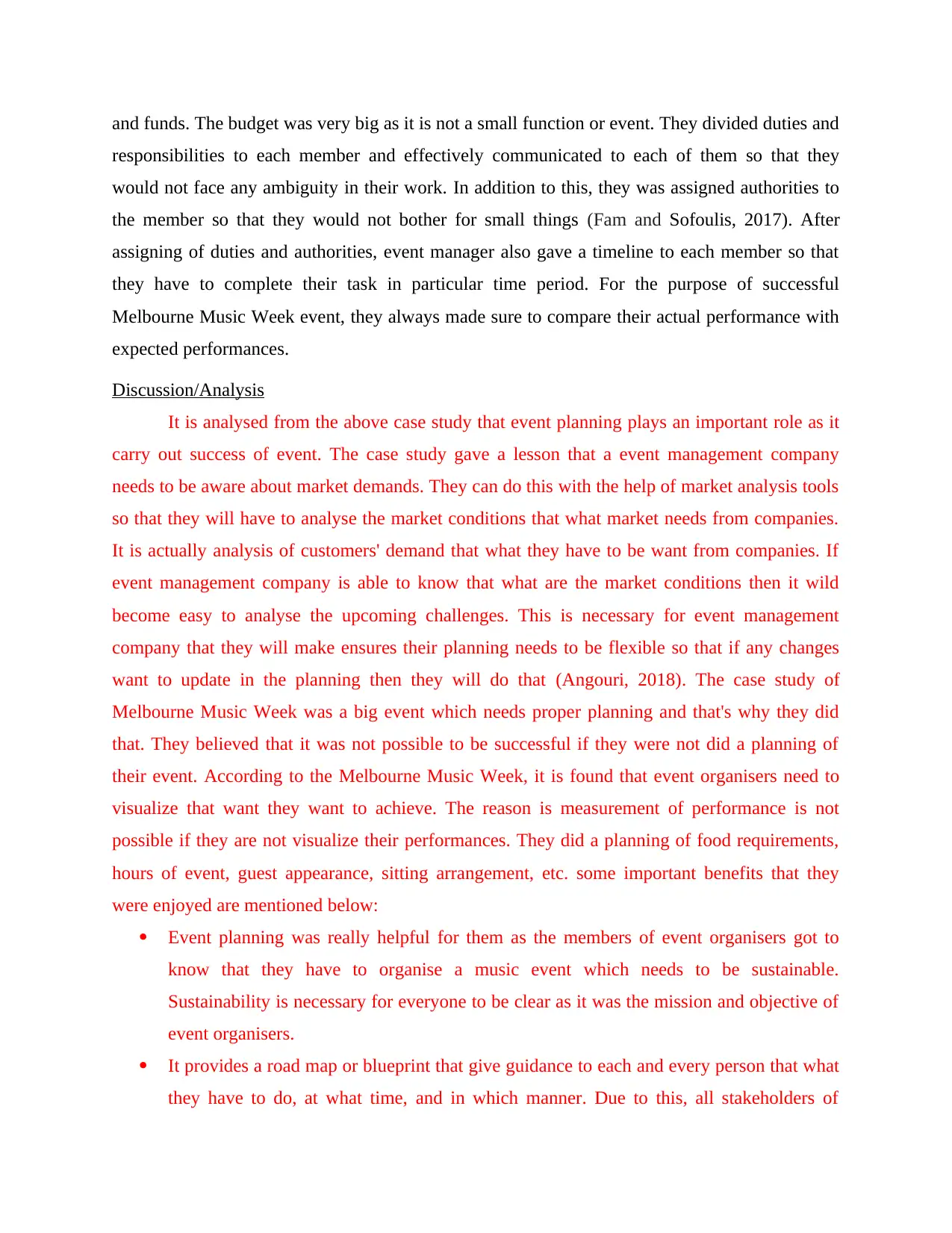
and funds. The budget was very big as it is not a small function or event. They divided duties and
responsibilities to each member and effectively communicated to each of them so that they
would not face any ambiguity in their work. In addition to this, they was assigned authorities to
the member so that they would not bother for small things (Fam and Sofoulis, 2017). After
assigning of duties and authorities, event manager also gave a timeline to each member so that
they have to complete their task in particular time period. For the purpose of successful
Melbourne Music Week event, they always made sure to compare their actual performance with
expected performances.
Discussion/Analysis
It is analysed from the above case study that event planning plays an important role as it
carry out success of event. The case study gave a lesson that a event management company
needs to be aware about market demands. They can do this with the help of market analysis tools
so that they will have to analyse the market conditions that what market needs from companies.
It is actually analysis of customers' demand that what they have to be want from companies. If
event management company is able to know that what are the market conditions then it wild
become easy to analyse the upcoming challenges. This is necessary for event management
company that they will make ensures their planning needs to be flexible so that if any changes
want to update in the planning then they will do that (Angouri, 2018). The case study of
Melbourne Music Week was a big event which needs proper planning and that's why they did
that. They believed that it was not possible to be successful if they were not did a planning of
their event. According to the Melbourne Music Week, it is found that event organisers need to
visualize that want they want to achieve. The reason is measurement of performance is not
possible if they are not visualize their performances. They did a planning of food requirements,
hours of event, guest appearance, sitting arrangement, etc. some important benefits that they
were enjoyed are mentioned below:
Event planning was really helpful for them as the members of event organisers got to
know that they have to organise a music event which needs to be sustainable.
Sustainability is necessary for everyone to be clear as it was the mission and objective of
event organisers.
It provides a road map or blueprint that give guidance to each and every person that what
they have to do, at what time, and in which manner. Due to this, all stakeholders of
responsibilities to each member and effectively communicated to each of them so that they
would not face any ambiguity in their work. In addition to this, they was assigned authorities to
the member so that they would not bother for small things (Fam and Sofoulis, 2017). After
assigning of duties and authorities, event manager also gave a timeline to each member so that
they have to complete their task in particular time period. For the purpose of successful
Melbourne Music Week event, they always made sure to compare their actual performance with
expected performances.
Discussion/Analysis
It is analysed from the above case study that event planning plays an important role as it
carry out success of event. The case study gave a lesson that a event management company
needs to be aware about market demands. They can do this with the help of market analysis tools
so that they will have to analyse the market conditions that what market needs from companies.
It is actually analysis of customers' demand that what they have to be want from companies. If
event management company is able to know that what are the market conditions then it wild
become easy to analyse the upcoming challenges. This is necessary for event management
company that they will make ensures their planning needs to be flexible so that if any changes
want to update in the planning then they will do that (Angouri, 2018). The case study of
Melbourne Music Week was a big event which needs proper planning and that's why they did
that. They believed that it was not possible to be successful if they were not did a planning of
their event. According to the Melbourne Music Week, it is found that event organisers need to
visualize that want they want to achieve. The reason is measurement of performance is not
possible if they are not visualize their performances. They did a planning of food requirements,
hours of event, guest appearance, sitting arrangement, etc. some important benefits that they
were enjoyed are mentioned below:
Event planning was really helpful for them as the members of event organisers got to
know that they have to organise a music event which needs to be sustainable.
Sustainability is necessary for everyone to be clear as it was the mission and objective of
event organisers.
It provides a road map or blueprint that give guidance to each and every person that what
they have to do, at what time, and in which manner. Due to this, all stakeholders of
⊘ This is a preview!⊘
Do you want full access?
Subscribe today to unlock all pages.

Trusted by 1+ million students worldwide
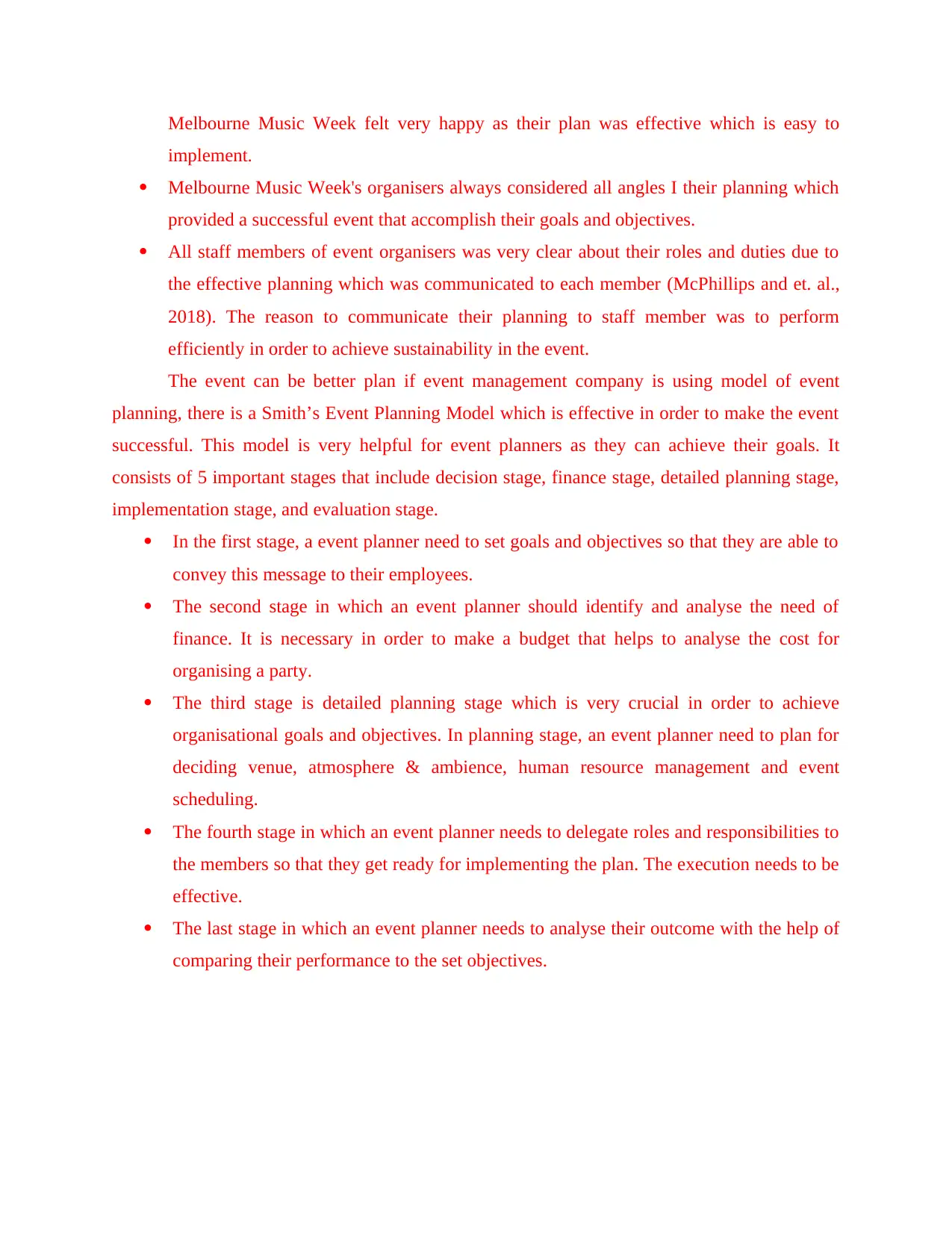
Melbourne Music Week felt very happy as their plan was effective which is easy to
implement.
Melbourne Music Week's organisers always considered all angles I their planning which
provided a successful event that accomplish their goals and objectives.
All staff members of event organisers was very clear about their roles and duties due to
the effective planning which was communicated to each member (McPhillips and et. al.,
2018). The reason to communicate their planning to staff member was to perform
efficiently in order to achieve sustainability in the event.
The event can be better plan if event management company is using model of event
planning, there is a Smith’s Event Planning Model which is effective in order to make the event
successful. This model is very helpful for event planners as they can achieve their goals. It
consists of 5 important stages that include decision stage, finance stage, detailed planning stage,
implementation stage, and evaluation stage.
In the first stage, a event planner need to set goals and objectives so that they are able to
convey this message to their employees.
The second stage in which an event planner should identify and analyse the need of
finance. It is necessary in order to make a budget that helps to analyse the cost for
organising a party.
The third stage is detailed planning stage which is very crucial in order to achieve
organisational goals and objectives. In planning stage, an event planner need to plan for
deciding venue, atmosphere & ambience, human resource management and event
scheduling.
The fourth stage in which an event planner needs to delegate roles and responsibilities to
the members so that they get ready for implementing the plan. The execution needs to be
effective.
The last stage in which an event planner needs to analyse their outcome with the help of
comparing their performance to the set objectives.
implement.
Melbourne Music Week's organisers always considered all angles I their planning which
provided a successful event that accomplish their goals and objectives.
All staff members of event organisers was very clear about their roles and duties due to
the effective planning which was communicated to each member (McPhillips and et. al.,
2018). The reason to communicate their planning to staff member was to perform
efficiently in order to achieve sustainability in the event.
The event can be better plan if event management company is using model of event
planning, there is a Smith’s Event Planning Model which is effective in order to make the event
successful. This model is very helpful for event planners as they can achieve their goals. It
consists of 5 important stages that include decision stage, finance stage, detailed planning stage,
implementation stage, and evaluation stage.
In the first stage, a event planner need to set goals and objectives so that they are able to
convey this message to their employees.
The second stage in which an event planner should identify and analyse the need of
finance. It is necessary in order to make a budget that helps to analyse the cost for
organising a party.
The third stage is detailed planning stage which is very crucial in order to achieve
organisational goals and objectives. In planning stage, an event planner need to plan for
deciding venue, atmosphere & ambience, human resource management and event
scheduling.
The fourth stage in which an event planner needs to delegate roles and responsibilities to
the members so that they get ready for implementing the plan. The execution needs to be
effective.
The last stage in which an event planner needs to analyse their outcome with the help of
comparing their performance to the set objectives.
Paraphrase This Document
Need a fresh take? Get an instant paraphrase of this document with our AI Paraphraser
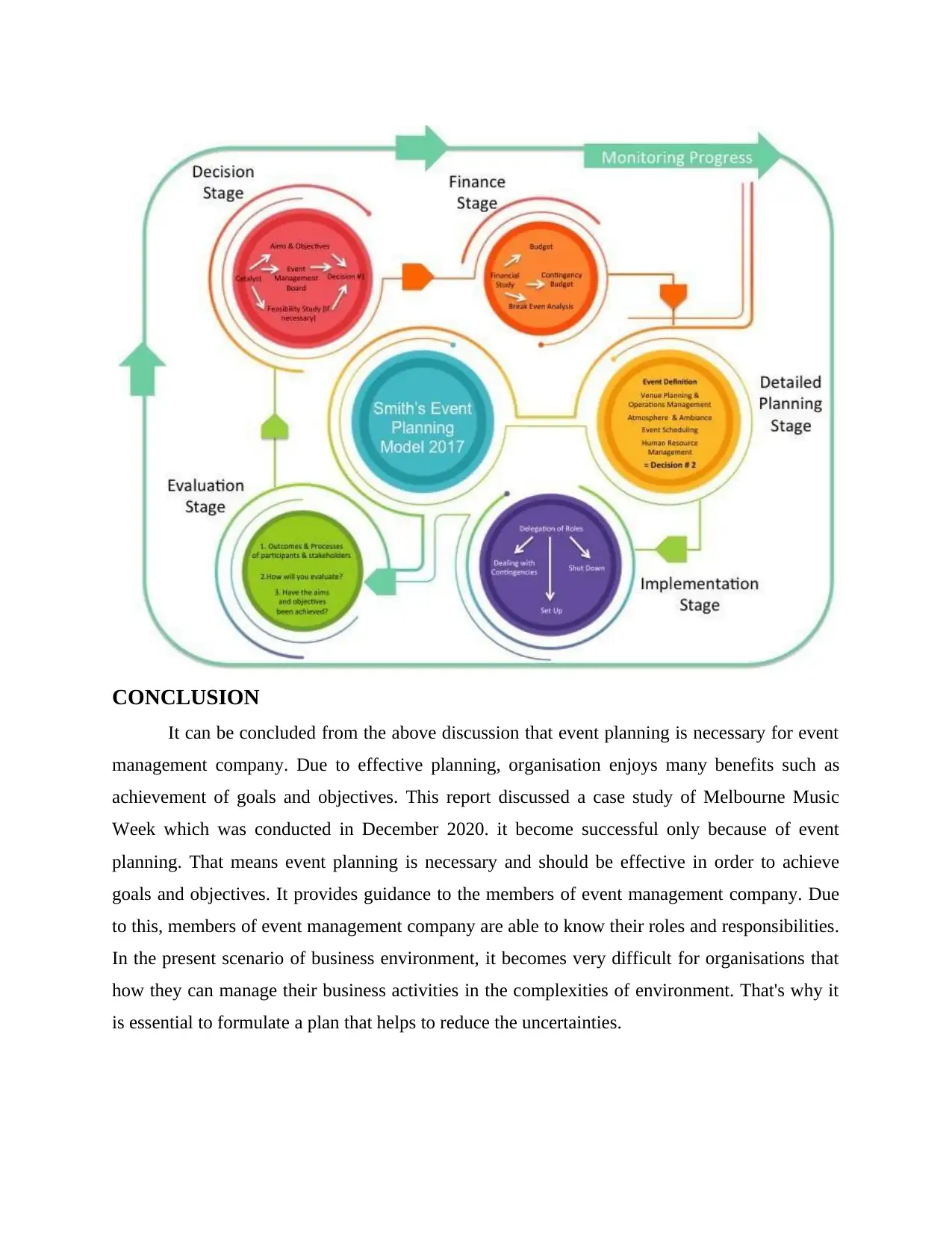
CONCLUSION
It can be concluded from the above discussion that event planning is necessary for event
management company. Due to effective planning, organisation enjoys many benefits such as
achievement of goals and objectives. This report discussed a case study of Melbourne Music
Week which was conducted in December 2020. it become successful only because of event
planning. That means event planning is necessary and should be effective in order to achieve
goals and objectives. It provides guidance to the members of event management company. Due
to this, members of event management company are able to know their roles and responsibilities.
In the present scenario of business environment, it becomes very difficult for organisations that
how they can manage their business activities in the complexities of environment. That's why it
is essential to formulate a plan that helps to reduce the uncertainties.
It can be concluded from the above discussion that event planning is necessary for event
management company. Due to effective planning, organisation enjoys many benefits such as
achievement of goals and objectives. This report discussed a case study of Melbourne Music
Week which was conducted in December 2020. it become successful only because of event
planning. That means event planning is necessary and should be effective in order to achieve
goals and objectives. It provides guidance to the members of event management company. Due
to this, members of event management company are able to know their roles and responsibilities.
In the present scenario of business environment, it becomes very difficult for organisations that
how they can manage their business activities in the complexities of environment. That's why it
is essential to formulate a plan that helps to reduce the uncertainties.
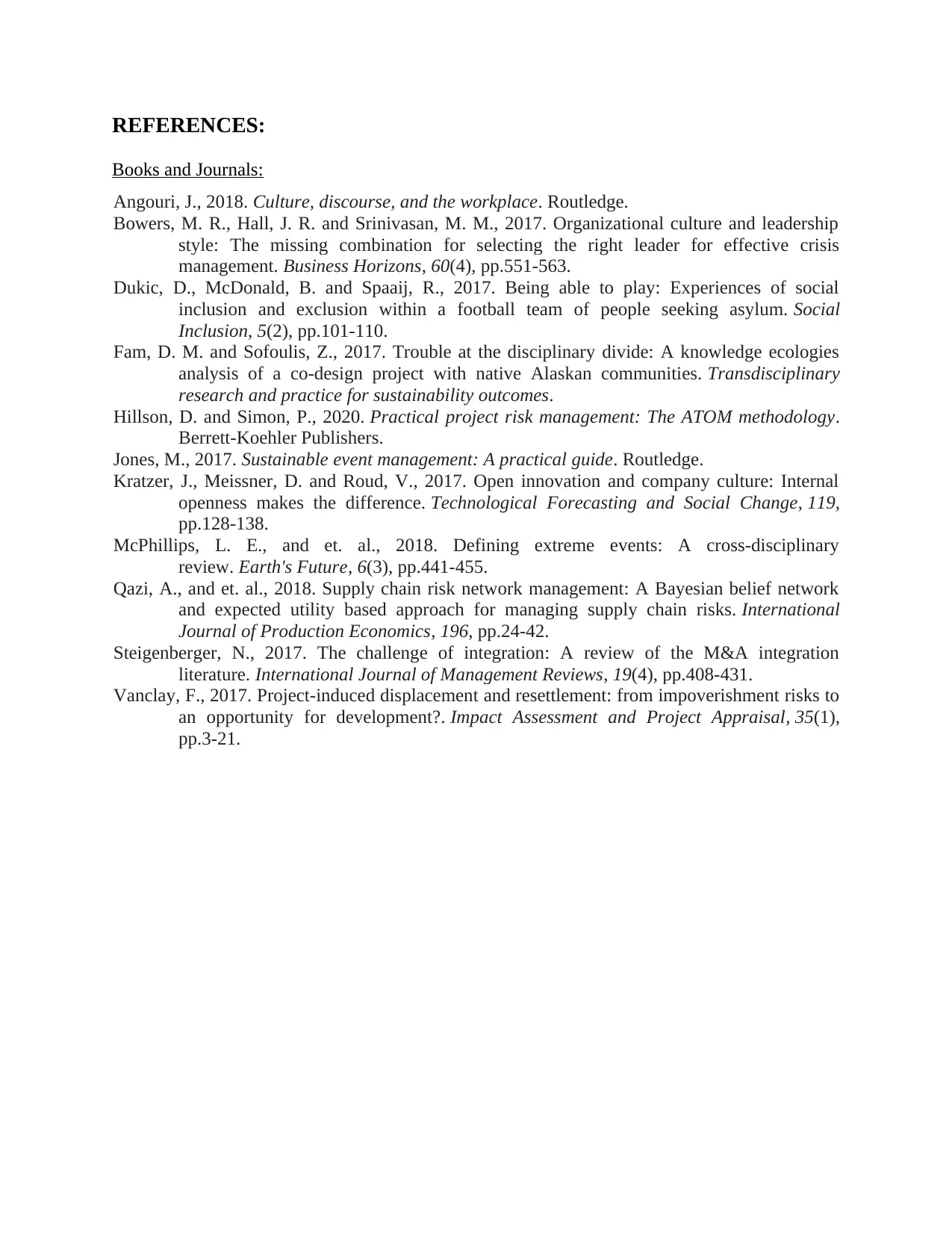
REFERENCES:
Books and Journals:
Angouri, J., 2018. Culture, discourse, and the workplace. Routledge.
Bowers, M. R., Hall, J. R. and Srinivasan, M. M., 2017. Organizational culture and leadership
style: The missing combination for selecting the right leader for effective crisis
management. Business Horizons, 60(4), pp.551-563.
Dukic, D., McDonald, B. and Spaaij, R., 2017. Being able to play: Experiences of social
inclusion and exclusion within a football team of people seeking asylum. Social
Inclusion, 5(2), pp.101-110.
Fam, D. M. and Sofoulis, Z., 2017. Trouble at the disciplinary divide: A knowledge ecologies
analysis of a co-design project with native Alaskan communities. Transdisciplinary
research and practice for sustainability outcomes.
Hillson, D. and Simon, P., 2020. Practical project risk management: The ATOM methodology.
Berrett-Koehler Publishers.
Jones, M., 2017. Sustainable event management: A practical guide. Routledge.
Kratzer, J., Meissner, D. and Roud, V., 2017. Open innovation and company culture: Internal
openness makes the difference. Technological Forecasting and Social Change, 119,
pp.128-138.
McPhillips, L. E., and et. al., 2018. Defining extreme events: A cross‐disciplinary
review. Earth's Future, 6(3), pp.441-455.
Qazi, A., and et. al., 2018. Supply chain risk network management: A Bayesian belief network
and expected utility based approach for managing supply chain risks. International
Journal of Production Economics, 196, pp.24-42.
Steigenberger, N., 2017. The challenge of integration: A review of the M&A integration
literature. International Journal of Management Reviews, 19(4), pp.408-431.
Vanclay, F., 2017. Project-induced displacement and resettlement: from impoverishment risks to
an opportunity for development?. Impact Assessment and Project Appraisal, 35(1),
pp.3-21.
Books and Journals:
Angouri, J., 2018. Culture, discourse, and the workplace. Routledge.
Bowers, M. R., Hall, J. R. and Srinivasan, M. M., 2017. Organizational culture and leadership
style: The missing combination for selecting the right leader for effective crisis
management. Business Horizons, 60(4), pp.551-563.
Dukic, D., McDonald, B. and Spaaij, R., 2017. Being able to play: Experiences of social
inclusion and exclusion within a football team of people seeking asylum. Social
Inclusion, 5(2), pp.101-110.
Fam, D. M. and Sofoulis, Z., 2017. Trouble at the disciplinary divide: A knowledge ecologies
analysis of a co-design project with native Alaskan communities. Transdisciplinary
research and practice for sustainability outcomes.
Hillson, D. and Simon, P., 2020. Practical project risk management: The ATOM methodology.
Berrett-Koehler Publishers.
Jones, M., 2017. Sustainable event management: A practical guide. Routledge.
Kratzer, J., Meissner, D. and Roud, V., 2017. Open innovation and company culture: Internal
openness makes the difference. Technological Forecasting and Social Change, 119,
pp.128-138.
McPhillips, L. E., and et. al., 2018. Defining extreme events: A cross‐disciplinary
review. Earth's Future, 6(3), pp.441-455.
Qazi, A., and et. al., 2018. Supply chain risk network management: A Bayesian belief network
and expected utility based approach for managing supply chain risks. International
Journal of Production Economics, 196, pp.24-42.
Steigenberger, N., 2017. The challenge of integration: A review of the M&A integration
literature. International Journal of Management Reviews, 19(4), pp.408-431.
Vanclay, F., 2017. Project-induced displacement and resettlement: from impoverishment risks to
an opportunity for development?. Impact Assessment and Project Appraisal, 35(1),
pp.3-21.
⊘ This is a preview!⊘
Do you want full access?
Subscribe today to unlock all pages.

Trusted by 1+ million students worldwide
1 out of 9
Related Documents
Your All-in-One AI-Powered Toolkit for Academic Success.
+13062052269
info@desklib.com
Available 24*7 on WhatsApp / Email
![[object Object]](/_next/static/media/star-bottom.7253800d.svg)
Unlock your academic potential
Copyright © 2020–2025 A2Z Services. All Rights Reserved. Developed and managed by ZUCOL.





